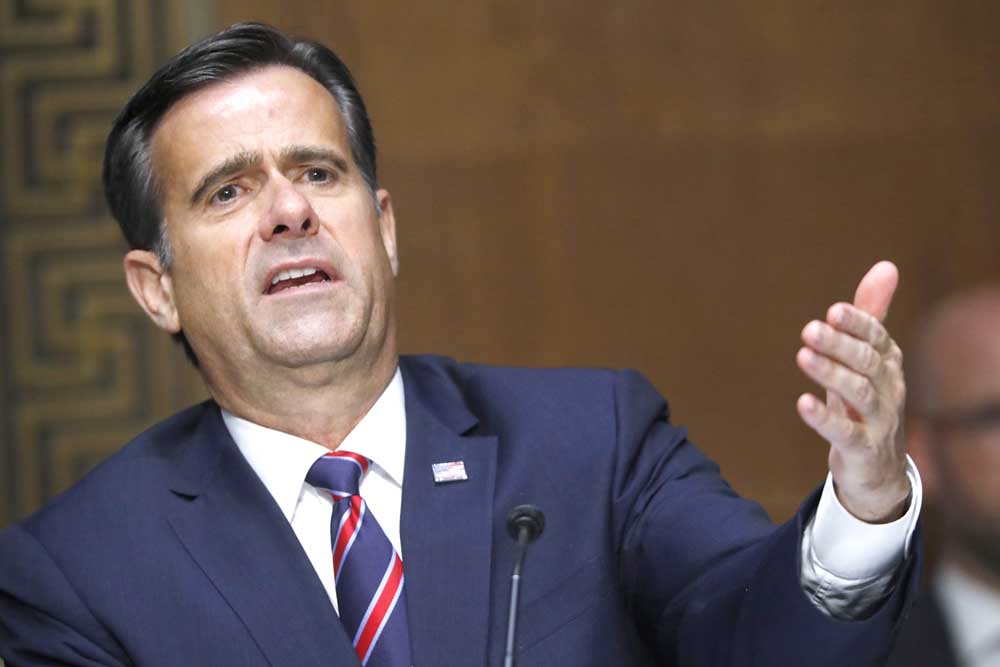Trump fills out Cabinet with Musk, ex-Texas rep, others
Published 4:00 pm Wednesday, November 13, 2024

- Now-former Rep. John Ratcliffe, R-Texas, testifies in May 2020 before a Senate Intelligence Committee nomination hearing on Capitol Hill in Washington, D.C. President-elect Donald Trump has picked Ratcliffe to be the director of the CIA. (Andrew Harnik/Pool/Getty Images/TNS)
From Wire Reports
President-elect Donald Trump continues to build his leadership team, with appointments being announced for a variety of Cabinet positions.
Trending
Among those selected by Trump is campaign mega-donor and billionaire Elon Musk and former National Intelligence Director and former Texas U.S. Rep. John Ratcliffe.
Defense Secretary
Trump is nominating Pete Hegseth, host of Fox News Channel’s weekend morning program and an Army National Guard officer, as his Defense secretary, the president-elect said in a statement o Tuesday evening.
“Pete has spent his entire life as a Warrior for the Troops, and for the Country,” Trump said in a statement. “Pete is tough, smart and a true believer in America First. With Pete at the helm, America’s enemies are on notice — Our Military will be Great Again, and America will Never Back Down.”
If confirmed by the Senate, Hegseth would take over the Pentagon at a time of heightened tensions in the Middle East, where Israel is battling Iranian proxies Hamas and Hezbollah, and in Ukraine, where Russian forces continue to gain on Kyiv’s troops, despite billions in military aid from the U.S. and allies.
China, at the same time, poses a long-term threat for Washington as it plows ahead with military innovation and building up its nuclear arsenal.
Trending
But Hegseth is an unconventional choice that has traditionally gone to onetime military leaders, lawmakers or government officials with decades of experience. Hegseth did once run a conservative group that advocated for greater privatization of the Department of Veterans Affairs, and had been considered for a role running that department during Trump’s first term.
If confirmed, he would take over what’s commonly regarded as the world’s largest organization and the largest U.S. employer, with more than 770,000 employees and 2 million men and women in uniform. Its budget is more than $840 billion, and its finances are so complicated it’s never successfully completed an audit.
In nominating Hesgeth, though, Trump would have a staunch loyalist helping spearhead what are expected to be radical changes at the Pentagon, which prides itself on being apolitical.
Hegseth, House Speaker Mike Johnson said on Tuesday night, is “somebody who will, I think be reform-minded. He’s highly qualified.”
In his campaign, Trump has promised to ban transgender people from the military, strip away diversity and inclusion policies in government, and has talked of using the National Guard and possibly the active-duty military to deport millions of undocumented immigrants.
The White House may also charge the new Pentagon boss with cutting costs from its budget and pivoting its procurement bureaucracy toward funding technology innovations.
There was high turnover for Pentagon chiefs in the first Trump administration. Retired four-star General James Mattis resigned in protest in late 2018 over Trump’s antipathy toward alliances, and later criticized him as someone “who tries to divide us.”
The second, Mark Esper, was more amenable on issues such as troop drawdowns in Afghanistan and Germany and focusing more personnel and funds on the border with Mexico. But even Esper was fired after objecting to Trump’s threats to use troops to quell protests sparked by the murder of George Floyd in 2020.
CIA director
Trump has picked Ratcliffe to be the director of the CIA, selecting a fierce loyalist from his first administration to lead the nation’s intelligence apparatus.
Ratcliffe, 59, is expected to bring a heavy focus on countering national security threats and foreign adversaries such as China and Iran to the position. If confirmed by the Senate, he will lead an agency with which Trump had an often hostile relationship in his first term.
During his first White House term, the president-elect often launched attacks on social media against U.S. intelligence agencies while at times praising adversaries including Russian President Vladimir Putin and North Korea’s Kim Jong Un.
That contentious relationship was largely driven by the agencies’ warnings that Russia meddled in the 2016 election in Trump’s favor. He accused the “deep state” of being “weaponized” against him and his allies. At a summit in Helsinki in 2018, he sided with Putin over U.S. agencies’ assessment of Moscow’s election interference.
Trump lauded Ratcliffe in a statement Tuesday, saying he “will be a fearless fighter for the Constitutional Rights of all Americans, while ensuring the Highest Levels of National Security, and PEACE THROUGH STRENGTH.”
Ratcliffe was director of national intelligence at the end of Trump’s first term, after serving as a Republican congressman from Texas, where he was first elected in 2014.
When first nominated by Trump to serve as national intelligence director, Ratcliffe came under scrutiny and withdrew his name from consideration amid accusations that he exaggerated his qualifications. Senate Republicans soured on Ratcliffe over questions about whether he misrepresented his role in prosecuting terrorism and immigration cases when he worked at the Justice Department.
However, Ratcliffe eventually won support for the nomination following his staunch defense of Trump during the former president’s first impeachment. That proceeding involved accusations Trump abused his powers by trying to coerce Ukrainian President Volodymyr Zelenskyy to open an investigation into Joe Biden before the 2020 election. Ratcliffe was confirmed by the Senate as national intelligence director in May 2020.
“The Trump administration will be inheriting an incalculably large and dangerous network of terrorist threats embedded within the 10 million people allowed to illegally enter the U.S. by border czar Kamala Harris,” Ratcliffe wrote on X in October, referring to Trump’s Democratic election rival.
Ratcliffe currently leads the America First Policy Institute’s Center for American Security, along with other former aides from Trump’s first administration, Keith Kellogg and Fred Fleitz. Half a year after Putin’s invasion of Ukraine, the trio authored a report titled “Ending Putin’s Invasion” calling on the U.S. to map out plans to convene peace talks between Ukraine and Russia.
Department of Government Efficiency
Trump announced Tuesday that Musk will lead the incoming administration’s planned Department of Government Efficiency, or “DOGE,” alongside former Republican candidate Vivek Ramaswamy.
“Together, these two wonderful Americans will pave the way for my Administration to dismantle Government Bureaucracy, slash excess regulations, cut wasteful expenditures, and restructure Federal Agencies — Essential to the “Save America” Movement,” Trump said in the announcement.
“It will become, potentially, ‘The Manhattan Project’ of our time,” he added, referring to the World War II-era research and development program to produce nuclear weapons.
Together, Musk and Ramaswamy will “provide advice and guidance from outside of Government, and will partner with the White House and Office of Management & Budget to drive large scale structural reform, and create an entrepreneurial approach to Government never seen before.”
Musk — who donated $75 million to Trump’s campaign — said Thursday that DOGE will “send shockwaves through the system, and anyone involved in Government waste, which is a lot of people!”
Musk and Ramaswamy’s tenure would run until July 4, 2026.
“A smaller Government, with more efficiency and less bureaucracy, will be the perfect gift to America on the 250th Anniversary of The Declaration of Independence,” Trump said. “I am confident they will succeed!”
Homeland Security secretary
In a move that further signals Trump’s commitment to enforce stringent controls on illegal immigration, the president-elect confirmed Tuesday he planned to appoint South Dakota Gov. Kristi Noem as secretary of the Department of Homeland Security.
Noem, 52, a Trump loyalist who has offered firm backing for the GOP leader’s promise to carry out mass deportations, will preside over a vast department that oversees multiple agencies, including the U.S. Customs and Border Protection, Immigration and Customs Enforcement, and the Federal Emergency Management Agency. The department has more than 260,000 employees and a $60 billion budget.
After Trump defeated Vice President Kamala Harris, Noem was asked how a Trump administration would carry out his plan to deport millions of immigrants who entered the country illegally.
“It is going to be a big operation,” she told NewsNation. “President Trump has already indicated that he wants to start by deporting the most dangerous first — those criminals, murderers, rapists that are threatening safety in our communities. They’re going to be the first ones on the list to go. And from there, yes, it’s a commitment, but it’s a commitment to our national security interests.”
Noem, who Trump once considered as a possible running mate, signaled the new GOP administration would eventually target immigrants who had not committed crimes after arriving in the U.S.
“When they came into our country, let’s all remember: The first thing they did was break the law,” she said.
A rancher, farmer and business owner, Noem is serving her second four-year term as governor of South Dakota. In 2018, she was elected the first woman to take on the role after running on a platform of protecting South Dakotans against tax increases and big government.
Even before Noem became governor, she expressed support for Trump’s immigration clampdown.
In 2017, when Noem was a U.S. representative for South Dakota, she expressed support for Trump’s “Muslim ban,” an executive order that temporarily suspended the U.S. refugee program and imposed a 90-day ban on immigrants from seven Muslim-majority countries.
“My first priority is the safety and security of the American people,” Noem said in a statement. “I share the President’s concerns about our ability to screen refugees — especially those from terrorist hotbed areas. I support putting a temporary pause on accepting refugees from terrorist-held areas — at least until the administration can certify that asylum-seekers do not present a safety threat to the U.S.”
After Biden won the White House, Noem was quick to voice opposition to his administration’s handling of the rising number of migrants crossing the southern border.
“South Dakota won’t be taking any illegal immigrants that the Biden Administration wants to relocate,” Noem wrote on X, formerly Twitter, in 2021. “My message to illegal immigrants … call me when you’re an American.”
In recent years, Noem sent multiple National Guard deployments to Texas to help secure its border with Mexico. In January, Noem said her administration was considering sending additional razor wire and security personnel.
“The United States of America is in a time of invasion,” Noem said in a speech to South Dakota legislators. “The invasion is coming over our southern border. The 50 states have a common enemy, and that enemy is the Mexican drug cartels. They are waging war against our nation. And these cartels are perpetuating violence in each of our states, even right here in South Dakota.”
Secretary of State
Trump will nominate Sen. Marco Rubio, R-Fla., for secretary of State.
Rubio, 53, is the top Republican on the Senate Intelligence Committee and the second-ranking GOP member on the Senate Foreign Relations Committee.
Rubio began in Congress as a hawkish internationalist but has recalibrated his position to be in step with Trump’s “America First” foreign policies.
In April, Rubio voted against giving Ukraine nearly $61 billion in additional defense assistance and economic aid as part of the national security supplemental law.
Rubio, previously a candidate to be Trump’s vice presidential pick, called the foreign assistance legislation to aid Ukraine, as well as Israel and Taiwan, “legislative blackmail” because the broader measure didn’t include a border control measure. But Rubio voted against an earlier version of the supplemental in February 2024 that did include a bipartisan border security compromise measure after Trump opposed it.
Rubio, who has publicly speculated about Russian President Vladimir Putin’s mental health and called him a “butcher,” has made a particularly dramatic turn since the 2016 GOP presidential primary when he mocked Trump’s inherited wealth and business bankruptcies and rebuked his isolationist views.
“You don’t have to be fan of Vladimir Putin to want the war to end,” Rubio said in an interview with NBC’s “Today” show after Trump’s win last week. “I think the Ukrainians have been incredibly brave and strong in standing up to Russia, but at the end of the day, what we are funding here is a stalemate war that needs to be brought to a conclusion because that country is going to be set back 100 years.”
A former Florida House speaker, Rubio rode to the Senate on the 2010 Tea Party wave. Once there, he differentiated himself not as a fiscal hawk but as a foreign policy specialist and a neoconservative. His years of bipartisan work on the Intelligence and Foreign Relations panels are expected to make for a smooth Senate confirmation process.
Senate Foreign Relations Democrats are expected to be relieved to have a familiar face leading Foggy Bottom and representing the U.S. around the world amid global uncertainty over what a second Trump presidency means for the regional alliances that the Biden administration worked to rebuild and expand after Trump’s turbulent first administration.
Since Trump left office, Rubio has championed legislation to limit the executive branch’s options regarding Russia. He co-sponsored with Sen. Tim Kaine, D-Va., a provision in the fiscal 2024 national defense authorization law that forbids Trump or any U.S. president from withdrawing from NATO without approval by a two-thirds Senate vote or an act of Congress. And he has introduced multiple Russia sanctions bills this Congress.
But Rubio’s hawkish stances are most closely associated with China. He opted to specialize in the country years before many of his GOP colleagues concluded that Beijing posed the most serious long-term strategic threat to U.S. interests. He has sponsored over 50 China-related bills in the current Congress.
Rubio, who is Cuban American, would be the first Hispanic secretary of State. He has long been the top Republican on the Senate Foreign Relations Western Hemisphere subcommittee and has used that perch to argue against relaxation of the trade embargo on Cuba and for strong sanctions against Venezuela.






